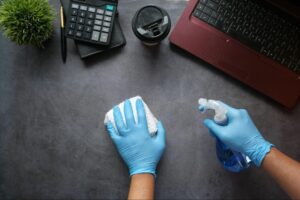
Spillage prevention is key to environmental safety. Spillage can be liquids, gases, or solids from vehicles, ships, and more. It can hurt the environment and people’s health. The government controls and watches industries to stop such things with proper spillage prevention rules.
Risk assessments, maintenance, and training for those using hazardous materials are needed. The government also gives guidelines and ways to manage waste to lower the chance of spills.
Small spills like oil leaks and chemical spills are not rare. So people must be careful with handling, transport, and storage of things that could do harm.
For example, a tanker carrying 30,000 liters of petrol toppled on a highway, causing traffic jams. The quick response team contained the spill. This shows how prevention, fast action, and regulations are important to keep the environment safe and protect people.
What Does Spillage Refer To
To understand the different types of spillage thoroughly, you are going to explore this section on ‘Types of spillage’ with ‘Liquid Spillage, Solid Spillage, and Gas Spillage’ as solutions. These sub-sections will introduce you to the different types of spillage and provide a brief overview of each. By the end of this section, you will have a basic understanding of the different types of spillage that can occur and their effects.
Liquid Spillage
Spillage of aqueous substances is an issue that can be seen in many places. It can be split into two main types: Splash and Leakage. Splash spillage is caused by overfilled containers or sudden shock. Leakage spillage is caused by leaks from the container. These spills can lead to death or destruction of property. To avoid this, follow safety procedures, store properly and do control activities when dealing with liquid spillage.
Solid spillage? Think Jenga! One wrong move and everything’s ruined.
Solid Spillage
When it comes to managing solid materials, several factors must be taken into account; among them, spillage. Spills of solid materials can be hazardous, posing a risk to both people and nature. If not taken care of correctly, they could lead to long-term contamination.
Take a look at this table, showing the different types of solid spillages.
| Type of Spillage | Description |
|---|---|
| Liquidizable Solids | Powders, grains and dusts that can turn into liquids when exposed to moisture. They should be quickly cleaned to avoid further mess. |
| Non-Liquidizable Solids | Substances like plastics, metals and glass that don’t dissolve or turn liquid in water. Special equipment may be needed for cleaning. |
| Toxic Solids | Asbestos and chemicals like pesticides. Special measures must be taken during clean-up. They require special handling and equipment. |
It is important to remember that each type of solid spillage needs an appropriate procedure for cleaning and disposal to avoid any harm. Also, knowing the source of the spill can help to prevent it from happening again. For instance, if you identify how the spill happened (e.g., wrong storage or handling) you can stop it from happening again.
In the past, we have seen the horrible effects of poor management of solid spills. For example, oil spills on land can contaminate soil for years, making it unusable and causing environmental issues. That’s why efficient management of solid spillages is essential for any business that wants to keep everyone safe and protect the environment.
Gas spillage may not be funny, but at least it’s a great excuse to blame the dog for the smell!
Gas Spillage
Gas leaks are hazardous and can cause huge harm. They occur due to faulty equipment, poor maintenance, improper handling, corrosion or natural disasters. Indoors, they can lead to nausea, headaches, fatigue, dizziness and even unconsciousness. Outdoors, they can ignite and cause massive explosions. This can create property damage and loss of life.
To avoid these calamities, regular maintenance of equipment is necessary and safety measures must be taken when transporting gas cylinders.
Additionally, these leaks can cause environmental pollution due to the harmful gases released. This can lead to air pollution which is a threat to flora and fauna.
The Tlahuelilpan town gas pipeline disaster in Mexico in 2019 is proof of the need for better regulation of safety precautions in relation to gas pipelines. Let’s face it, nobody likes to be the janitor who has to clean up a spill that could have been prevented.
Importance of spillage prevention
To understand the importance of spillage prevention with respect to the environment, health, and economy, you need to comprehend the gravity of spillage. In this section titled ‘Importance of spillage prevention with environmental impacts of spillage, health hazards of spillage, and economic costs of spillage as solutions’, we will highlight the need for preventing spillage in order to tackle the adverse effects it can have on various aspects of life.
Environmental impacts of spillage
Spillage presents huge harms to the environment. It messes up delicate ecosystems, and puts humans’ health in danger. Poisonous materials and chemicals can spread into water sources and damage aquatic creatures, flora and fauna. Moreover, hazardous materials’ spillage may trigger air pollution, leading to breathing problems. It also limits mobility in polluted places, and increases greenhouse gases that accelerate climate change. Stopping spillage is necessary for keeping the environment healthy.
Neglecting to stop spillage can cause severe consequences, such as soil degradation and fires that burn plants and animals. For example, oil spills in oceans can ruin marine ecosystems; they contaminate habitats which provide many commercial activities, like fishing and tourism. Moreover, spilled materials can reach groundwater, spoiling drinking water and destroying nearby farming lands.
The direct effect of spillage is the destruction of natural habitats. The indirect effects, however, last for many years after the incident. They include a financial burden on people who use agricultural or hunting activities, and business owners whose businesses depend on clean environments, like restaurants and resorts. So, it’s essential to know how to prevent these occurrences.
Pro Tip: EMS (Environmental Management Systems) can help to avert the fallout from oil spills and toxic wastes. This saves time and money, and brings peace of mind. Don’t risk a slip and trip – prevent a spill and chill!
Health hazards of spillage
Spillage can be hazardous to both people and the environment. Exposure to chemicals can cause skin irritation, respiratory problems, cancer, and more. Toxins released into the air can affect air quality and hurt wildlife. It’s important to contain spills to avoid health risks and environmental damage.
Long-term exposure to pollutants can cause brain damage or organ failure. Disposing of toxic materials is necessary to protect people and the environment. When working with hazardous materials, take safety measures and wear protective gear.
Pro Tip: Assume all materials have the potential to spill and take precautions. Storage techniques, handling procedures, and cleaning methods are key. Spillage prevention may seem costly, but the economic costs of a spill can be immense – e.g. BP oil spill.
Economic costs of spillage
Preventing spillage is vital to avoiding costly losses. Cleanup expenses, damaged or replaced equipment, legal fines, and claims can all add up. This affects businesses’ profits and sustainability, and has a ripple effect across the entire supply chain.
Oil and chemical industries pose even more economic risks. Neglecting prevention could lead to irreversible environmental harm and public health hazards. Plus, the long-term consequences on reputation and customer loyalty can be huge.
It’s obvious that many past spills happened because of inadequate prevention efforts (due to negligence or lack of resources). This can lead to financial implications that could have been avoided with better prevention. So why take a chance? Prevention is way better than paying for the aftermath!
Government’s involvement in spillage prevention
To understand how the government involves in spillage prevention, refer to the regulatory measures, enforcement laws, and research and development initiatives mentioned. The regulatory measures taken by the government ensure industries adhere to spill control practices. Enforcement of spillage prevention laws ensures that individuals and organizations abide by regulations, and research and development initiatives are made to prevent spills from occurring.
Regulatory measures taken by the government
The government has implemented measures to prevent spillages. Rules, like mandatory reporting and financial penalties, are in place for land, sea and air industries. A regulatory agency monitors compliance and promotes best practices.
Research and new technology is being done to minimize the risk of marine and sea pollution incidents. This includes navigation systems and alternative fuels for shipping.
Spillages are a danger to communities and industry. Everyone must take an active role in preventing them, or face severe consequences like hefty fines, losing their business license or even jail time.
Everyone is responsible for preventing spills. The government’s involvement shows they care about protecting the environment and future generations. We must make sure to take every precaution to avoid disaster.
Enforcement of spillage prevention laws
The government is on alert, monitoring industries to make sure they comply with spill laws. Failing to meet standards could mean fines, license suspension, or even jail.
Inspection teams have the power to check industry-installed measures. If any deviation from compliance is found, the companies get a legal summons – either for explanation or penalty. This system keeps regulations in line.
It’s essential to remember that not following regulations can cause environmental damage and harm wildlife. Industries need to be more conscious of their responsibilities – regularly maintaining their premises, workshops educating personnel on safety and insurance cover.
UNEP reports that 40% of spills in developing nations are due to human activities – leading to major enviro-damage each year.
Research and development initiatives to prevent spillage
To stop leaks and protect the environment, the government has begun many research and development efforts to make sure companies in several industries obey spill prevention rules. The table below explains some of these initiatives:
| Industry | Initiative |
|---|---|
| Oil and Gas | Detection tech for early warnings |
| Chemicals | Handling hazardous materials training |
| Agriculture | Soil conservation policies to stop runoff |
It’s important to take action in different industries because it helps avoid spills. But, some unique areas need attention too. For example, dealing with spills in distant places such as national parks can cause tricky coordination and logistics problems. In one case, during an oil drilling job in a guarded region of the Amazon Rainforest, a pipeline leak caused major environmental damage. The government quickly issued heavy fines to both parties in the operation and extended its legal framework overseeing activities in ecologically valuable areas. Industries are essential for controlling spills, but let’s face it, they are more into spilling cash than oil.
Role of industries in spillage prevention
To learn about the role industries play in spillage prevention with emphasis on the keyword “what does spillage refer to”, dive into the Implementation of spillage prevention measures by industries, and the Cooperation with the government for spillage prevention.
Implementation of spillage prevention measures by industries
Industries have an essential job in spillage prevention. Taking steps can help reduce harm from spills and protect their workers and the environment. Everyone must participate for this to work, from teaching staff about hazardous materials to having spill kits ready in case of accidents. Using the right tech and updating equipment can also help protect against unexpected spills.
Working with the government to stop spills? Sounds great, but then you remember that even the government can’t stop their own leaks.
Cooperation with the government for spillage prevention
Collab’ing with gov to stop spillage is key for industries. Implementing regulations, sticking to safety standards, and timely reporting are all necessary. Mutual cooperation is a must for success.
Industries should set up regular contact and coordination with spillage-preventing gov agencies. Meetings, seminars, and workshops are great ways to do this. Plus, guidelines on storage, transport, usage, and disposal of substances that harm the environment must be followed.
Moreover, joint research can help discover effective ways to reduce spillage. This could include testing handling measures and analytical procedures often used in industries.
Pro Tip: Preparing an emergency response plan can help manage spills swiftly, minimising damage to marine life and coastal environments.
Spillage prevention: because cleaning up a mess is never as fun as making one.
Best practices for spillage prevention
To adopt the best practices for spillage prevention with regular maintenance of equipment, employee training and awareness programs, and emergency response planning and preparedness is the solution. Exploring these sub-sections will give you deeper insights into how the government can prevent spills and protect the environment.
Regular maintenance of equipment
To stop spillage incidents, equipment must be kept in top shape. Neglecting upkeep of machines can cause component failure, which can spark a big spill. So, regular maintenance of machinery is key for preventing spills.
- Inspect machines often. Look out for anything strange and fix/replace affected parts right away.
- Make sure the correct amount of lubricants and filters are in hydraulic systems.
- Have a planned preventive maintenance (PPM) schedule that includes cleaning and safety checks.
Analyzing data from predictive maintenance techniques can help identify potential faults before they happen. Also, training workers who handle the machinery should keep spills at bay.
As per the 2021 Industrial Spillage Report from Tetra Tech Inc., a Cali engineering firm; about 30% of all industrial spills were due to poor machine maintenance. So, make sure your employees know how to handle spills like their job depends on it, because it does.
Employee training and awareness programs
To prevent spills, consistent training of employees and awareness programs are essential. Frequent spill response drills and proper handling practices can help minimize spill-related incidents. Also, creating an atmosphere where employees understand the dangers of spills leads to more responsible behavior.
Moreover, providing educational materials such as safety posters and handouts helps reinforce essential practices for managing spills. Essential info on protective gear, spill cleanup procedures, and waste disposal are important for reducing risks. Retraining beyond initial orientation is also important due to new equipment or products presenting new challenges.
Employee training should also include identifying warning signs of potential spills and addressing them quickly. Regular facility inspections should be performed to foresee any unsafe conditions or hazardous materials that could cause spills.
The Deepwater Horizon offshore site oil leak in April 2010 in the Gulf of Mexico showed the tragic outcomes of inadequate staff education. Poor communication and response measures during the disaster had severe consequences.
Thus, industries can protect their reputation and minimize environmental damage, avoid worker injury, and fines from regulatory agencies through regular employee training initiatives and heightened employee awareness programs. Be prepared for the worst; have an emergency response plan for when coffee spills.
Emergency response planning and preparedness
To prepare for potential spillage or leakage, proactive measures should be taken. This includes creating an emergency response plan and making sure personnel are ready. Training everyone in communication protocols, using equipment, and safety procedures is essential.
Identifying the hazard and its impact quickly is important. Managers must keep people informed of changes that could affect the response.
Assessing risks and liabilities from spillages from activities inside and outside the company is necessary. Preventing risks is better than dealing with legal consequences later.
A tanker ship was discharging oil cargo at night when a hose detached, spilling crude oil onto the quay side. The power went out, so the siren couldn’t sound the alarm. Emergency teams had to use vehicles with sirens. To avoid this catastrophe, contingency measures should have been in place.
Conclusion: Importance of Spillage Prevention and the need for government and industry cooperation.
Efficient Spillage Prevention is essential! It requires collaboration between government and industry. Identify potential sources, take preventive measures, have backup plans.
Regulations guarantee safe handling of hazardous substances and no impact on humans, biodiversity, and environment.
Preventive measures include: regular maintenance, staff training, protective gear, technology. Or else, dire consequences like loss of life and economic damage.
Industries must stay up-to-date with government guidelines. Environmentally sensitive operations improve reputation and business continuity.
Act now! Don’t wait until it’s too late. Ensure efficient Spillage Prevention!












